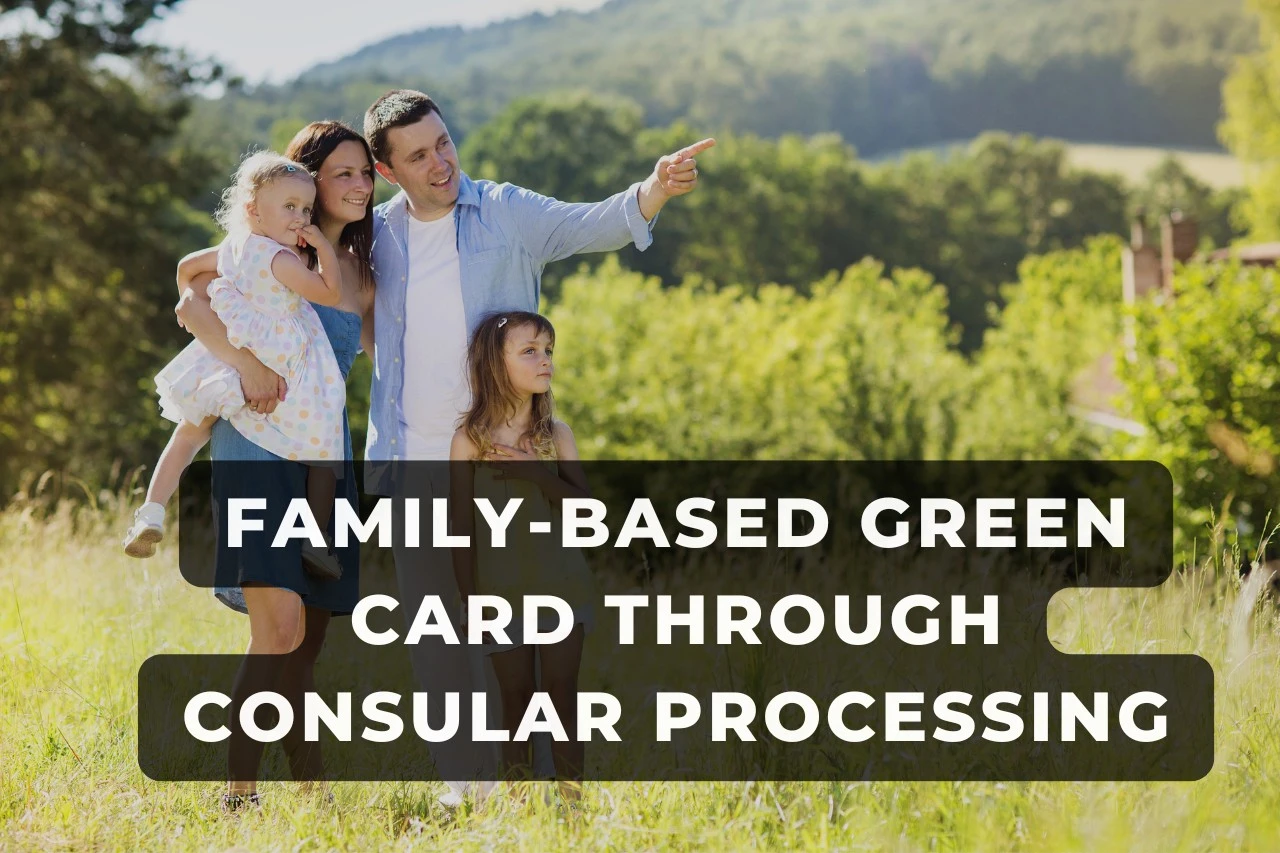For U.S. citizens and lawful permanent residents, sponsoring family members for a green card is a meaningful way to reunite loved ones and help them obtain lawful residency in the United States. If your relative is living outside the U.S., they will typically go through consular processing, which allows them to apply for an immigrant visa at a U.S. embassy or consulate abroad. This guide outlines the steps involved in the family-based green card consular processing and explains how an experienced immigration attorney can make the process smoother and more efficient by ensuring accuracy, preventing delays, and addressing legal challenges.
Who Can Sponsor a Family Member for a Green Card?
The U.S. immigration system allows family-based petitions for two main groups:
- Immediate Relatives of U.S. Citizens: Spouses, unmarried children under 21, and parents of U.S. citizens.
- Family Preference Categories:
- F1: Unmarried adult children (21 or older) of U.S. citizens
- F2A: Spouses and unmarried children (under 21) of green card holders
- F2B: Unmarried adult children (21 or older) of green card holders
- F3: Married children of U.S. citizens
- F4: Siblings of U.S. citizens (petitioner must be at least 21 years old)
Step-by-Step Process of Family-Based Consular Processing
Step 1: Filing Form I-130 (Petition for Alien Relative)
The sponsoring U.S. citizen or lawful permanent resident must submit Form I-130 to U.S. Citizenship and Immigration Services (USCIS). This form establishes the qualifying family relationship.
- If approved, USCIS forwards the case to the National Visa Center (NVC) for further processing.
- If denied, USCIS will provide reasons for the denial. An immigration attorney can help file an appeal, correct errors, or reapply with stronger evidence.
Step 2: National Visa Center (NVC) Processing
Once USCIS approves the I-130, the case is transferred to the NVC, which collects the necessary fees and documents:
- Affidavit of Support (Form I-864) and financial documents.
- Visa Application (Form DS-260).
- Supporting Documents: Civil documents, police clearance certificates, and medical exam results.
An immigration attorney can assist in preparing the financial documents, verifying eligibility, and ensuring that no required forms or evidence are missing, reducing the risk of processing delays.
Step 3: Visa Interview at U.S. Consulate or Embassy
Once the NVC approves all documents, the applicant is scheduled for a visa interview at a U.S. embassy or consulate in their home country. During the interview:
- The consular officer reviews the application and supporting documents.
- The officer assesses the legitimacy of the family relationship.
- If approved, the applicant receives an immigrant visa in their passport.
An immigration attorney can help prepare the applicant for the visa interview, ensuring they understand the process, expected questions, and necessary documentation to avoid refusals.
Step 4: Entry to the U.S. as a Permanent Resident
After visa approval, the immigrant must:
- Pay the USCIS Immigrant Fee before traveling to the U.S.
- Enter the U.S. within the visa validity period.
- Receive the green card by mail within a few weeks of arrival.
Legal guidance ensures that all entry procedures are followed correctly to avoid complications at the border or delays in receiving the green card.
Common Challenges and How an Immigration Attorney Can Help
- Delays or Requests for Evidence (RFEs): If USCIS or the NVC requests additional information, an attorney can prepare a strong response to avoid prolonged delays.
- Financial Sponsorship Issues: If the petitioner does not meet income requirements, an attorney can help explore joint sponsorship or alternate financial solutions.
- Visa Denials or Inadmissibility: Certain visa denials due to past immigration violations, medical conditions, or criminal history require legal expertise. An attorney can assist in filing waivers or appeals.
- Errors in the Application Process: Simple mistakes or incomplete forms can lead to rejections. A legal expert ensures every step is handled correctly the first time.
Why Work With an Immigration Attorney?
A family-based green card is a life-changing process, and working with an immigration attorney ensures:
- Accurate and complete petition filing, reducing chances of denials or delays.
- Expert guidance through complex legal issues, such as inadmissibility concerns and sponsorship requirements.
- Faster processing with fewer mistakes, as attorneys ensure all paperwork meets USCIS and NVC standards.
- Assistance with visa interview preparation, increasing the chances of approval.
- Legal support in case of denials or complications, providing strategic solutions to move the process forward.
Start Your Family Reunification Process Today
If you’re ready to sponsor a family member for a green card through consular processing, don’t navigate the process alone. Our experienced immigration attorney is here to guide you through every step, ensuring accuracy, efficiency, and a higher chance of success. Contact our law firm today to begin the journey to reunite with your loved ones in the United States.
Disclaimer: This is Not Legal Advice
The information provided in this blog is for general informational purposes only and should not be construed as legal advice. While we strive to ensure that the information is accurate and up to date, it may not reflect the most current legal developments. Immigration laws and policies are subject to change, and individual circumstances can vary greatly. Therefore, you should consult with a licensed immigration attorney or qualified legal professional for advice specific to your case. Reliance on the information provided in this blog is solely at your own risk.



